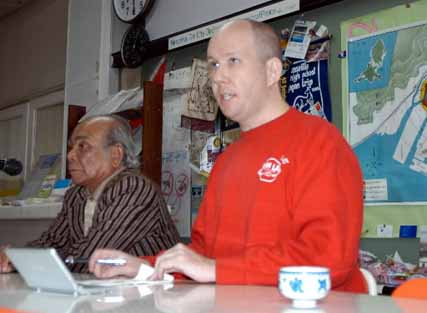American interpreter to convey the reality of the A-bombing in the U.S.
Nov. 21, 2008
by Michiko Tanaka, Staff Writer
Richard Dorf, 37, an employee of the Hiroshima city government, will return to his hometown of San Diego, California. Mr. Dorf will move back to the U.S. at the beginning of next year to care for his mother, 68, who lives alone and has recently fallen ill. Although he loves Hiroshima, where he has spent the past seven years, and will surely miss it, he views the situation with a positive spirit, believing his return to the U.S. is somehow a fateful step for the future.
Mr. Dorf has also been working as a volunteer interpreter for three years at Hiroshima Youth Hostel, which holds an event called “An Evening of Peace and International Exchange” about once a month. At this event, A-bomb survivors come to share their experiences of the atomic bombing with hostel guests from abroad and Mr. Dorf interprets the survivors’ testimonies into English for the many people in attendance.
This role came to Mr. Dorf when he happened to join the event and ended up helping that evening’s interpreter. After that, he took up the interpreting job himself and, to date, has interpreted for about 30 A-bomb survivors.
The horrific experiences these survivors were forced to endure have been very moving for Mr. Dorf to interpret. In the U.S., many people still firmly believe that the atomic bombings were a necessary decision. “It upsets me that these people don’t understand the U.S. made a terrible mistake,” says Mr. Dorf.
Mr. Dorf has also learned new Japanese expressions in his work at the hostel, such as “pika,” which refers to the flash of light from the A-bomb, and “nyushi hibaku,” the state of being exposed to the bomb’s radiation upon entering the city after the blast. This growing vocabulary is the result of Mr. Dorf’s desire to translate each word from the survivors as accurately as possible. Many guests of the hostel have shed tears when they listened to the A-bomb testimonies and Mr. Dorf’s interpretation, saying, “This is the first time I really understood the suffering of the people of Hiroshima.”
The next gathering for “An Evening of Peace and International Exchange” will likely be the last opportunity for Mr. Dorf to interpret for A-bomb survivors. Staff members of the youth hostel will miss Mr. Dorf, calling him “humble” and “sincere” and admiring his “perfect” Japanese.
Mr. Dorf’s favorite farewell gift, in fact, is a DVD with footage of a recent exchange event at the hostel. Although he realizes it will take time to raise awareness among Americans in regard to the true horror of nuclear weapons, he hopes to show this DVD to young people in the U.S. “I will start with my alma mater,” said Mr. Dorf, smiling.
(Originally published on November 18)
Richard Dorf, 37, an employee of the Hiroshima city government, will return to his hometown of San Diego, California. Mr. Dorf will move back to the U.S. at the beginning of next year to care for his mother, 68, who lives alone and has recently fallen ill. Although he loves Hiroshima, where he has spent the past seven years, and will surely miss it, he views the situation with a positive spirit, believing his return to the U.S. is somehow a fateful step for the future.
Mr. Dorf has also been working as a volunteer interpreter for three years at Hiroshima Youth Hostel, which holds an event called “An Evening of Peace and International Exchange” about once a month. At this event, A-bomb survivors come to share their experiences of the atomic bombing with hostel guests from abroad and Mr. Dorf interprets the survivors’ testimonies into English for the many people in attendance.
This role came to Mr. Dorf when he happened to join the event and ended up helping that evening’s interpreter. After that, he took up the interpreting job himself and, to date, has interpreted for about 30 A-bomb survivors.
The horrific experiences these survivors were forced to endure have been very moving for Mr. Dorf to interpret. In the U.S., many people still firmly believe that the atomic bombings were a necessary decision. “It upsets me that these people don’t understand the U.S. made a terrible mistake,” says Mr. Dorf.
Mr. Dorf has also learned new Japanese expressions in his work at the hostel, such as “pika,” which refers to the flash of light from the A-bomb, and “nyushi hibaku,” the state of being exposed to the bomb’s radiation upon entering the city after the blast. This growing vocabulary is the result of Mr. Dorf’s desire to translate each word from the survivors as accurately as possible. Many guests of the hostel have shed tears when they listened to the A-bomb testimonies and Mr. Dorf’s interpretation, saying, “This is the first time I really understood the suffering of the people of Hiroshima.”
The next gathering for “An Evening of Peace and International Exchange” will likely be the last opportunity for Mr. Dorf to interpret for A-bomb survivors. Staff members of the youth hostel will miss Mr. Dorf, calling him “humble” and “sincere” and admiring his “perfect” Japanese.
Mr. Dorf’s favorite farewell gift, in fact, is a DVD with footage of a recent exchange event at the hostel. Although he realizes it will take time to raise awareness among Americans in regard to the true horror of nuclear weapons, he hopes to show this DVD to young people in the U.S. “I will start with my alma mater,” said Mr. Dorf, smiling.
(Originally published on November 18)








